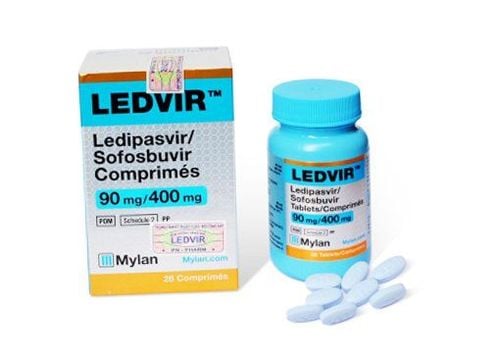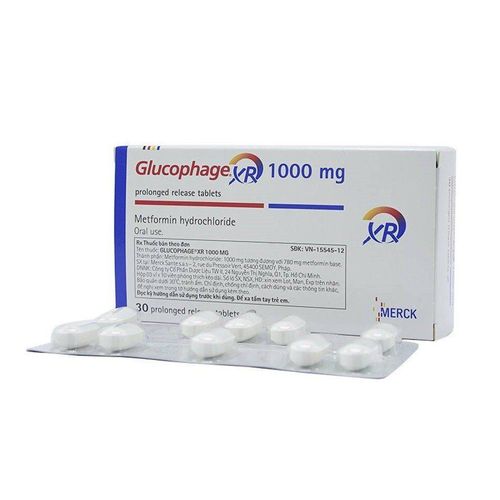This is an automatically translated article.
Gludipha 500 is a diabetes medication whose main active ingredient is Metformin hydrochloride 500mg. To ensure effective use and avoid side effects, patients need to strictly follow the instructions of the doctor, professional pharmacist.
1. What is Gludipha 500?
What is Gludipha 500? Gludipha 500 is a drug of Vidipha Central Pharmaceutical Joint Stock Company, prescribed by doctors to treat non-insulin-dependent diabetes mellitus (type II) (used as monotherapy when it is not possible to treat hyperglycemia with diet) Simple). In addition, metformin can be used with a sulfonylurea when diet and when metformin or a sulfonylurea alone does not provide adequate glycemic control.
2. Uses and indications of Gludipha 500
Gludipha 500 has the main active ingredient Metformin hydrochloride 500mg and excipients. Gludipha 500 is available as a film-coated tablet.
2.1. Indications of the drug Gludipha 500 Gludipha 500 is prescribed by a doctor to treat the following pathologies:
Gludipha 500 is used to treat non-insulin dependent diabetes: The drug is used as monotherapy when the drug cannot be treated. Treatment of hyperglycemia by the method of building a diet alone. Metformin may be used concurrently with a sulfonylurea when diet and either metformin or a sulfonylurea alone are not effective for adequate glycemic control. 2.2.Contraindications to the use of Gludipha 500 Gludipha 500 is contraindicated in the following cases:
People with severe cardiovascular disease such as: congestive heart failure, acute myocardial infarction, cardiovascular collapse. The patient has an infection, is traumatized (having to treat diabetes with insulin). People with impaired kidney function, or kidney dysfunction. Patients with hypersensitivity to the active ingredient metformin or other ingredients in the drug. Patients with acute and chronic metabolic acidosis, with or without coma (including diabetic ketoacidosis). People with severe liver disease, severe respiratory disease with chronic hypoxia. Severe infections, bacteremia. Cases of acute metabolic decompensation. Woman is pregnant. Persons who are temporarily discontinuing metformin for those undergoing radiographic contrast injections. The patient is alcoholic and malnourished.
3. Usage and dosage of Gludipha 500
Gludipha 500 is made in the form of film-coated tablets, so the drug is taken orally
Dosage for each specific subject is as follows:
Adults:
For adults, start taking 1 tablet / time and take 2 times/day. Increase the dose by adding 1 tablet per day, increase 1 time per week, the maximum level is only 5 tablets / day. With a dose of 4 tablets / day, divided into 2 times a day. If you are prescribed a dose of 5 tablets / day, then divide it into 3 times a day (taken with meals), so that the body can absorb the drug more effectively. Elderly:
Elderly people using Gludipha 500 with the starting dose and maintenance dose need special caution, because it may cause a decrease in renal function. As recommended by the manufacturer and doctors, the elderly should not be treated with the maximum dose of metformin.
When switching to another diabetes medication: There is practically no transition, unless the patient is switching from chlorpropamide. When switching from chlorpropamide to using Gludipha 500, patients need to be careful in the first 2 weeks, because the persistence of chlorpropamide is prolonged in the body, causing drug interactions and hypoglycemia. Treatment of metformin and oral sulfonylureas: If a patient on the drug does not respond to a 4-week treatment regimen at the maximum dose of metformin in monotherapy, an additional dose of oral sulfonylurea is required while continuing metformin with maximum dose. When the maximum dose of both drugs is combined and the patient does not respond within 1-3 months, it is necessary to discontinue antidiabetic therapy and initiate insulin. In people with kidney or liver damage: Because of the risk of lactic acidosis, which is often fatal, metformin should not be used in people with a history of kidney disease, and metformin should be avoided in people with symptoms. clinical and laboratory liver disease. Children: The dosage form of this medicine is not recommended.
4. Note when using Gludipha 500
When the patient is taking metformin, regular monitoring of laboratory tests and blood glucose levels is required to determine the minimum effective dose. In addition, information about the risk of lactic acidosis should be sought. Adjusting the scientific diet Metformin is excreted mainly by the kidneys, so the risk of accumulation and lactic acidosis increases with the degree of renal function decline. Check serum creatinine before initiating Gludipha 500 treatment in the elderly. Discontinue metformin 2-3 days before an iodinated contrast X-ray is indicated and within 2 days of the scan. Concomitant use with drugs that affect renal function affects the distribution of the active substance metformin. Discontinue metformin during surgery. Pregnancy: Metformin and drugs containing this active ingredient are contraindicated for women who are pregnant. Consult your doctor when treating diabetes in pregnant women Lactating women: There are currently not many studies on the use of metformin in lactating women or determining the level of metformin. secreted into breast milk. Therefore, consider discontinuing the drug or stopping breastfeeding. Let's rely on how important the drug is to the mother. Use in Driving and Using Machines: There are currently no data on the effects of the drug on people who drive and use machines. Therefore, this subject also needs to be very careful when using the drug.
5. Side effects of Gludipha 500
During the use of Gludipha 500, patients may experience some of the following side effects:
Common effects:
Digestive: Digestive disorders anorexia, nausea, vomiting, diarrhea, constipation , heartburn, epigastric pain Skin: urticaria, photosensitivity. Metabolism: decreased vitamin B12 levels. Rare effects:
Hematology: Aplastic anemia, blood dysplasia, hemolytic anemia, agranulocytosis.thrombocytopenia. Metabolic: lactic acidosis.
6. Drug interactions
Decrease effect: Drugs that increase blood glucose: diuretics, corticosteroids, phenothiazines, thyroid preparations, oral contraceptives, phenytoin, nicotinic acid, sympathomimetics, calcium channel blockers, isoniazid can lead to decreased blood glucose control. Increased effect: Furosemide increased maximal plasma and blood concentrations of the active ingredient metformin, but did not alter the renal clearance of metformin in single-dose studies. Increased toxicity: Cationic drugs that are eliminated by tubular secretion may interact with the active ingredient metformin by competing with the usual tubular transport system. In addition, the combination with cimetidine or drugs containing this active ingredient should be avoided.
In summary, Gludipha 500 is a diabetes medication whose main active ingredient is Metformin hydrochloride 500mg. To ensure effective use and avoid side effects, patients need to strictly follow the instructions of the doctor, professional pharmacist.
Follow Vinmec International General Hospital website to get more health, nutrition and beauty information to protect the health of yourself and your loved ones in your family.
Please dial HOTLINE for more information or register for an appointment HERE. Download MyVinmec app to make appointments faster and to manage your bookings easily.













